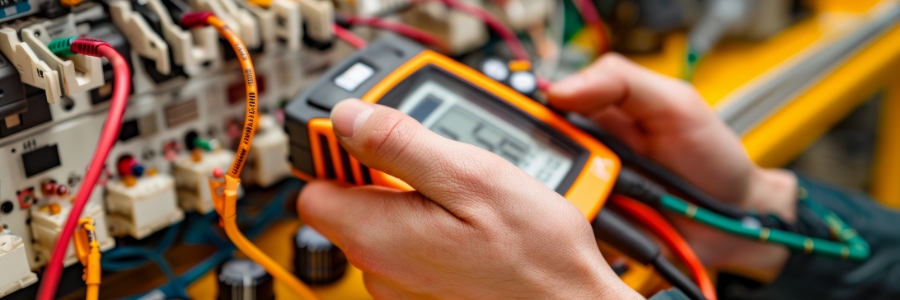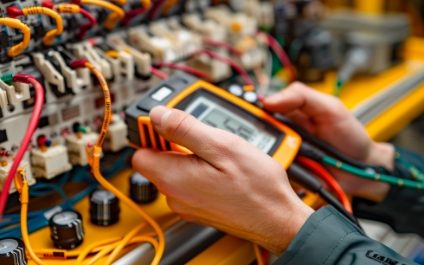
Whether you're a seasoned IT professional or just beginning your journey in data cabling infrastructure, understanding the various types of cable testers is essential for maintaining the quality and reliability of your cabling systems. Cable testers are vital tools used to diagnose issues, ensure connectivity, and verify proper installation of cables. But with so many options available, which one is the best for your needs? Let’s explore the different types of cable testers and how they serve specific functions.
-
Continuity Testers
Continuity testers are the most basic form of cable testers, designed to check if a cable is functioning as intended by determining whether there's a continuous electrical path through the cable. These testers are useful for identifying breaks, shorts, or miswiring in cables.
- Best for: Simple electrical checks and determining if the wiring is intact.
- Common Uses: Electrical wiring, coaxial cables, and telephone lines.
-
Wiremap Testers
Wiremap testers are essential when verifying that each wire in a cable is correctly terminated at both ends. They ensure that the wiring configuration, such as a T568A or T568B pattern for Ethernet cables, is correctly aligned. This type of tester helps to identify split pairs, crossed wires, or incorrect terminations.
- Best for: Verifying proper cable termination.
- Common Uses: Data cabling such as Cat5, Cat6, and other Ethernet cables.
-
Signal Testers
Signal testers are designed to check the strength and integrity of the signal being transmitted through the cable. These testers analyze the quality of the signal and measure parameters such as loss and interference. Signal testers are crucial in determining whether a cable is capable of transmitting data reliably without errors or interruptions.
- Best for: Measuring signal quality and strength.
- Common Uses: High-speed data networks, including fiber optic and Ethernet cables.
-
TDR (Time Domain Reflectometer) Testers
TDR testers are advanced devices that locate breaks or faults within a cable by sending a signal down the line and measuring the time it takes for the reflection to return. These testers are excellent for pinpointing the exact location of the fault, which saves time when repairing or troubleshooting long cable runs.
- Best for: Locating specific cable faults in long runs.
- Common Uses: Telecommunications, fiber optics, and Ethernet cabling.
-
Certification Testers
Certification testers are high-end devices used to verify that a cable meets specific standards such as ISO/IEC or ANSI/TIA. These testers go beyond basic continuity or wiremap testing by measuring performance criteria like crosstalk, insertion loss, and return loss. Certification testers are often required when installing cabling systems in commercial or industrial environments, ensuring that the installation meets professional requirements.
- Best for: Ensuring compliance with industry standards.
- Common Uses: New installations of Ethernet, fiber optic, and other structured cabling systems.
-
PoE (Power over Ethernet) Testers
PoE testers are specialized tools designed to test and verify PoE connections. These testers ensure that the correct voltage and power levels are supplied to devices such as IP cameras, VoIP phones, and wireless access points through Ethernet cables.
- Best for: Verifying PoE functionality in Ethernet cables.
- Common Uses: IP cameras, VoIP phones, and other PoE-enabled devices.
-
Network Cable Testers
Network cable testers are multifunctional devices designed to assess the performance of data cables, particularly in Ethernet networks. These testers provide detailed information on cable length, wiring configurations, and signal integrity. Many modern network cable testers also offer diagnostic features, such as checking for network connectivity, speed, and identifying connected devices.
- Best for: Comprehensive cable testing in data networks.
- Common Uses: Ethernet cabling in local area networks (LANs).
-
Fiber Optic Cable Testers
Fiber optic cable testers are highly specialized devices used to test the integrity and performance of fiber optic cables. These testers measure light transmission loss, signal integrity, and other fiber-specific parameters. Given the unique nature of fiber optics, these testers are essential for maintaining the high-speed performance of fiber-based networks.
- Best for: Testing fiber optic cables.
- Common Uses: High-speed internet backbones, telecommunications, and data centers.

Network Cabling
This article offers a comprehensive guide to different types of cable testers, from basic continuity testers to advanced certification tools. It helps readers understand which tester is best suited for tasks like verifying cable terminations, testing signal strength, or ensuring compliance with industry standards. Whether you’re troubleshooting or installing networks, this guide equips you with the knowledge to select the right tools for the job.